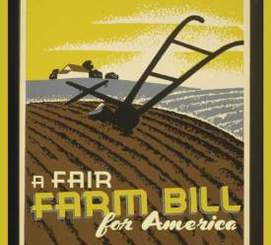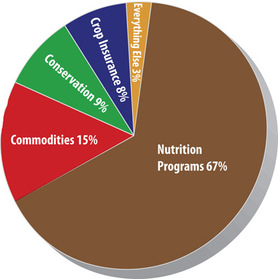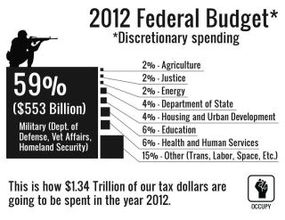
Let your congressman know how you feel, CLICK HERE
Why the rush? It comes as a mandate from a super committee of six senators and six house members who are cutting $1.2 trillion from the federal deficit over the next ten years. The super committee was formed to address the deficit crisis. The USDA's $300 billion budget (aka, Farm Bill) is responsible for cutting $23 billion. $15 billion is set to come from subsidies, $4 billion from conservation programs, like "Know Your Farmer, Know Your Food," and even $4 billion from nutrition programs like SNAP (Supplemental Nutrition Assistance Program). The $15 billion is aimed at reducing some of the wasteful direct payments made to farmers. These were payments not for the losses they incur, low yields they produce or even land that was in operation. No, these were payments just because these farmers had land available for commodity crops. Good riddance, right? Well, not if big ag lobbyists have anything to say. Instead, new subsidies with fancy new names are being proposed that essentially do the same thing to cushion commodity farmers when prices drop. If grassroots lobbyists had the same power and money to persuade politicians, perhaps a face lift for their programs would have the same effect.

Rushing things does not help the case for progressive new programs like The Beginning Farmer and Rancher opportunity Act. Those will be the first to get hit. The frenetic pace to close a deal does not create an environment for evaluation and reform. Under pressure to meet the deadline, these closed-door meetings will probably vote in favor to keep the commodity and crop insurance programs relatively in tact. The Farm Bill is intended to support the entire agricultural system and build equity through the entire supply chain from grower to consumer. The very essence of the Farm Bill is undermined by the super committee's mandate. How can a good job be done and the best interests of all be considered with this kind of pressure? As Daniel Imhoff said in his October 3rd Farm Bill article in The Nation, "At its worst, the Farm Bill perpetuates the counterproductive policies and priorities of American agriculture." Looking like another bad year.

In this economy, the Farm Bill should be seen as a jobs bill. If allowed to reach its full potential, the Farm Bill could pay for itself with the economic stimulus it provides the food movement. In Daniel Imhoff's The Nation article, he pointed to The Beginning Farmer and Rancher Opportunity Act and Agriculture Secretary Tom Vilsack's plan to create 100,000 NEW farmers. And programs like the Organic Agriculture Research & Extension Initiative could be leveraged to help conventional farms transition to organic. Now we're cooking....create new farmers and help transition conventional farmers with loans, education and marketing support!
If given the time it deserves, the Farm Bill would hear from nonprofit organizations like The Environmental Working Group on their recommendations for 2012:
- Eliminate direct payments to farmers.
- Provide EVERY farmer free crop insurance for losses of 30% or more
- Insurance companies should have to bid the federal government in order to service farmers.
- Require conventional farmers adhere to a basic set of conservation guidelines.
- Full transparency by the USDA as to who and how much each farmer receives in subsidies and crop insurance.
The Ag committee was meant to have their recommendation by Monday, November 7th. Hopefully, enough pressure has mounted to give the Farm Bill not just an extension but the time it rightly deserves...September 30, 2012.

 RSS Feed
RSS Feed
